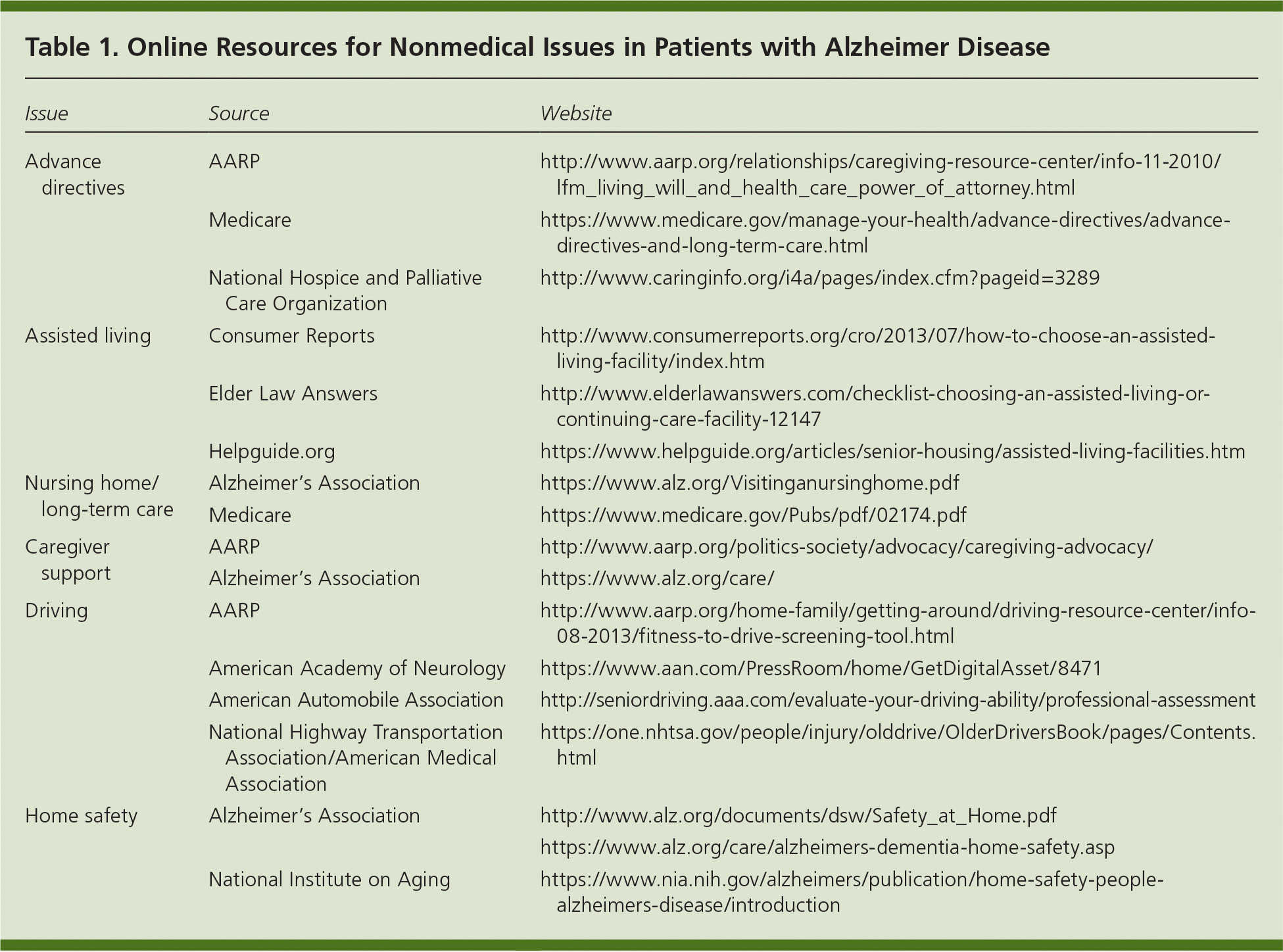
Am Fam Physician. 2017;95(12):766-767
Related article: Alzheimer Disease: Pharmacologic and Nonpharmacologic Therapies
Author disclosure: No relevant financial affiliations.
In this issue of American Family Physician, Dr. Epperly and colleagues review therapies for managing the cognitive and functional symptoms of Alzheimer disease.1 Although the review discusses nonpharmacologic therapies, it focuses primarily on medications that are widely used in practice. Indeed, prescriptions for medications to treat cognitive impairment have increased worldwide as much as sixfold over the past decade.2
As the authors point out, these medications—which in controlled trials result in a statistically significant improvement in cognitive function—often do not make much real-life difference for patients. That is because these medications are studied in clinical trials with large sample sizes, in which even small differences calculate as statistically significant. Those statistically significant differences in cognition amounted to only a two- or three-point improvement on a 70-point scale in one study 3 and a 0.8-point improvement on a 30-point scale in another.4 These minimal changes typically do not translate into meaningful improvements in the daily life of patients with Alzheimer disease. Most importantly, these medications do not alter the course of the disease.
It is certainly reasonable to try these medications; Alzheimer disease is devastating, and even minor short-term improvements in cognition can be beneficial to patients and their families. However, cognitive decline will inevitably continue, and as pointed out in a previous editorial in American Family Physician, clinicians should be ready to discontinue these medications if there is no meaningful difference in a patient's functional status.5 Unfortunately, failure to discontinue these medications is common. A substantial percentage of patients with Alzheimer disease still receive them, even in the advanced stages when no important benefit is possible.6 This unnecessarily exposes patients to adverse drug effects, and they continue to incur considerable cost.7
Dr. Epperly and colleagues point out that exercise, mental stimulation programs, enjoyable leisure activities, and occupational therapy can be helpful. Rather than focusing on medications to achieve a small temporary difference in cognition, patients and families might be better served if we focused more on nonpharmacologic treatments such as these, and on more important issues, such as advance directives, driving, living arrangements, caregiver support, and home safety (Table 1). Unlike medications, which are easy to prescribe, these issues can be challenging for physicians, patients, and families. As a result, they are often considered too late or not at all.

Management of Alzheimer disease should begin at the time of diagnosis with a discussion about goals of care, taking into consideration the patient's comorbidities, overall prognosis, available resources, and values, and the preferences of the patient and his or her family. Then, rather than reacting to isolated issues, a comprehensive plan with shared decision-making should form the framework for ongoing care.
Advance directives are the cornerstone that guides care in a life-limiting illness such as Alzheimer disease. But even among patients with severe dementia, a recent study indicates that only 40% of patients in nursing homes and 27% of those in the community have treatment-limiting advance directives.8 The result is often futile treatments and unnecessary costs. How many of these patients might have had advance directives if their physician had discussed it with them early in the course of their illness?
Living arrangements and caregiver support are also important. Who will care for the patient when independent living is no longer possible? Can we minimize stress for family members unexpectedly thrust into caretaker roles?9 Where will the patient live? What is the appropriate balance between safety and independence? Can arrangements be made early to avoid less-than-optimal decisions when urgent situations occur?
Clinicians should routinely discuss driving with patients diagnosed with dementia. The only recent study on this issue indicates that as many as 43% of patients with dementia who drive will have a car crash.10 There is a validated, easy-to-use instrument (Clinical Dementia Rating [CDR], http://knightadrc.wustl.edu/cdr/PDFs/CDR_Table.pdf) to help clinicians assess a patient's suitability for driving. Although the five-item instrument does not specifically assess driving skills, a practice guideline from the American Academy of Neurology gives it an A-level rating for determining whether a patient is at risk of unsafe driving.11 A normal score on the CDR is zero; patients who score 0.5 or 1 have an 11% or 24% chance, respectively, of failing an on-road driving test. More information about the CDR is available at http://alzheimer.wustl.edu/cdr/cdr.htm. When there is concern about a patient's ability to drive safely, organizations such as the American Automobile Association and the AARP can help arrange driving evaluations that include on-road driving tests. Pursuing such evaluations is an important step that many clinicians do not take.
Helping with these issues will likely benefit patients and families more than prescribing medications that provide, at best, marginal short-term improvements. However, it requires time, knowledge of community resources, and the ability to access them. New Medicare reimbursement codes for care coordination and cognitive function assessments should help address these issues.12,13 We encourage clinicians to include them in care plans for patients with Alzheimer disease.